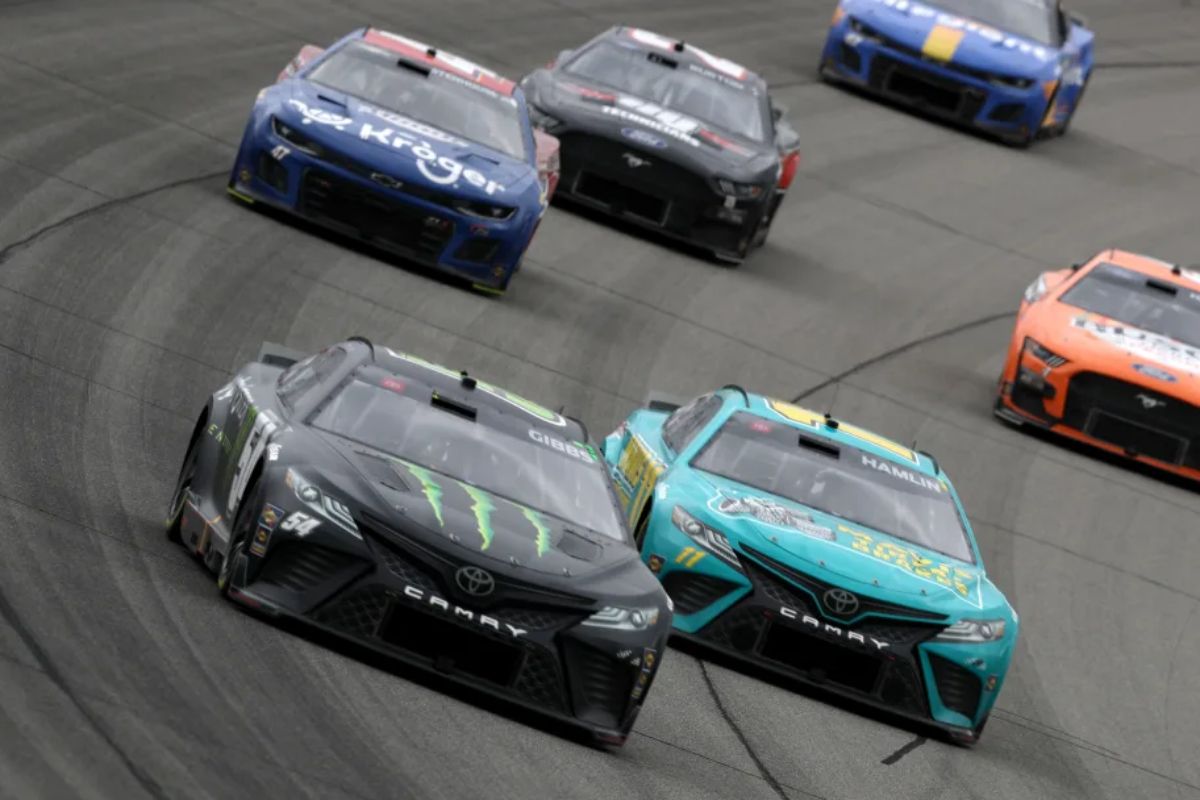Kevin Harvick Slams NASCAR’s Championship Format: Kevin Harvick‘s recent critique of NASCAR’s championship format prompts a critical examination of how the sport defines success and fairness. His argument centers on the notion that the current playoff system, which places undue emphasis on individual race victories, undermines the significance of consistent performance throughout the season. As he calls for a reevaluation of the single-race finale and its implications for competitive integrity, questions arise regarding the balance between entertainment and the true measure of a driver’s skill. What changes could reshape the championship landscape to better reflect the essence of racing excellence?
Key Highlights
- Kevin Harvick criticizes the single-race finale for failing to accurately represent drivers’ consistent performances throughout the season.
- He argues that the knockout playoff format compromises competitive integrity, favoring luck over skill in championship outcomes.
- Harvick highlights the need for a merit-based inclusion of top drivers, expressing concern about talented drivers being excluded from the playoffs.
- He calls for a reevaluation of the playoff structure to emphasize consistency and strategic planning over sporadic race wins.
- Harvick’s insights stress the importance of balancing entertainment value with the actual racing ability to maintain championship credibility in NASCAR.
Questions Raised About Championship Determination
Many fans and analysts likewise question whether a single race can truly embody the merits of an entire season in NASCAR. The discussion surrounding the championship format often pivots on the inherent tension between a prolonged, arduous 36-race schedule and the finality of a single event determining the season’s champion. Critics argue that reducing a season’s worth of performance—consistency, strategy, and resilience—to a single race at Phoenix Raceway undermines the accomplishments of the drivers and teams who have endured the rigorous demands of the entire season.
The stakes of the championship race are undeniably high; however, the potential for an unexpected outcome raises concerns about the integrity of the championship. A champion crowned based on one race may not reflect the true level of competitiveness exhibited throughout the season. This notion was particularly articulated during Kevin Harvick’s Happy Hour podcast, where he engaged in a frank dialogue about the playoff structure with co-hosts Mamba Smith and Kaitlyn Vincie. They emphasized the importance of considering playoff eligibility criteria, which further complicates the debate surrounding championship resolution.
As the NASCAR landscape evolves, the need for a format that equitably represents drivers’ performances throughout the entirety of the season becomes increasingly pressing. The current structure may need to undergo considerable reevaluation to guarantee that it honors the dedication and skill displayed over 36 races, rather than allowing a singular, potentially capricious moment to define a driver’s legacy.
Kevin Harvick’s Views on Current Playoff Structure
Kevin Harvick, a prominent figure in NASCAR and the initial champion under the current playoff structure, has articulated a layered perspective on the format that has dominated the sport for nearly a decade.
While acknowledging the entertainment value it brings, Harvick also highlights several concerns that merit consideration for potential reform.
- Competitive Integrity: Harvick argues that the knockout format, which eliminates drivers based on point standings, can undermine the essence of racing. A single bad race can drastically alter a team’s championship prospects, leading to questions about the fairness of the system.
- Champion Representation: The current format culminates in a ‘winner-takes-all’ finale, which Harvick believes may not accurately reflect the comprehensive performance of drivers throughout the season. He contends that a true champion should be established by consistent excellence, rather than by the outcome of a single race.
- Fan Engagement: Although the excitement generated by the playoffs is palpable, Harvick suggests that the structure could alienate traditional fans who prefer a more straightforward championship establishment. The complexity of the format might detract from the sport’s historical roots and broader appeal.
As discussions about potential changes continue, his perspective serves as a pivotal touchpoint for understanding the evolving landscape of NASCAR.
Harvick’s Criticism of the Single-Race Finale
Amid the excitement generated by NASCAR’s current playoff system, a critical examination reveals considerable flaws in the single-race finale format. Kevin Harvick’s pointed critique highlights a notable concern: the championship is determined by a single race, potentially undermining the value of consistent performance throughout the season.
As Harvick articulates, the prevailing structure favors drivers who excel on a given day, rather than those who have maintained a steady level of performance over the entire season. A one-off race at Phoenix Raceway may captivate fans, but it raises questions about fairness in crowning a champion.
Harvick argues that this approach leads to a championship outcome heavily influenced by luck and situational factors, rather than the cumulative skill and consistency that characterize successful racing. In a sport where fractions of moments can dictate outcomes, the argument for a multi-race finale becomes increasingly compelling.
The current format, while thrilling, risks reducing the championship narrative to a single moment, overshadowing the broader story of a driver’s season. Harvick advocates for a system where two or three races would determine the champion, fostering a more thorough evaluation of a driver’s capabilities.
This change could mitigate the potential for controversy that arises from a single race outcome, ensuring that the most deserving driver, based on sustained excellence, is awarded the championship title. Ultimately, it is a call for a reassessment of how success in NASCAR is defined and rewarded.
Playoff Eligibility and Criticism of Race Wins
The current playoff eligibility criteria in NASCAR have sparked considerable debate, particularly regarding the emphasis placed on race wins over consistent performance throughout the season. Critics, including veteran driver Kevin Harvick, argue that this system can distort the true competitive nature of the sport. The recent playoff entries of drivers with limited success raise questions about the fairness of a format that rewards singular victories rather than sustained excellence.
“We’re going to have the same conversation about the champion, right? I still believe that it shouldn’t come down to one race. I still believe that two or three races should determine the championship. I look at the whole points system and structure. It’s super exciting, but it’s also very open for controversy.” – Harvick
Key concerns regarding the current playoff eligibility framework include:
- Inconsistent Performance: Drivers such as Harrison Burton and Daniel Suarez, who have secured playoff berths despite lackluster overall performances, challenge the notion of meritocracy in the sport. Their entries, based on isolated wins, may undermine the accomplishments of more consistent competitors.
- Impact on Competition: The focus on race wins can create a scenario where drivers take unnecessary risks to secure a victory, potentially compromising the integrity of the sport. This dynamic can introduce an element of luck that disrupts the competitive balance NASCAR aims to maintain.
- Long-Term Implications: The precedent set by rewarding sporadic success may discourage teams from investing in long-term strategies aimed at consistent performance, ultimately affecting the general quality of racing in the series.
Harvick’s Concerns About the Best Drivers in Playoffs
Concerns about the validity of playoff placements have intensified in view of NASCAR’s current format, particularly regarding whether the best drivers are truly competing for the championship.
Kevin Harvick’s recent commentary highlights the tension between rewarding race wins and ensuring that the most skilled drivers compete for the title. Harvick questions if the playoff system genuinely includes the best 16 cars, expressing a preference for a competitive field that prioritizes merit over excitement.
“Do we want our best 16 cars? Or do we want it to be exciting? I agree with everything that’s going on and this is not anything against Harrison Burton or Daniel Suárez, but are those our best 16 cars that we are going to have racing for the championship? Or does it matter?” – Harvick
This dilemma is exemplified by the looming possibility of talented drivers like Bubba Wallace and Kyle Busch missing the playoffs, raising doubts about the effectiveness of the current format. Harvick advocates for a system that emphasizes consistency alongside victories, arguing that a focus solely on wins can dilute the competitive integrity of the playoffs. He posits that the championship should reflect the pinnacle of racing excellence, not just momentary successes.
“I’m a traditional racer that wants the best 16 guys to race for that championship.” – Harvick
However, the current structure serves a dual purpose: it incentivizes teams with fewer resources to aim for wins, providing them with a path to playoff competition. This approach fosters competition among smaller teams and improves their sponsorship prospects.
News in Brief: Kevin Harvick Slams NASCAR’s Championship Format
In conclusion, Kevin Harvick’s critique of NASCAR’s championship format highlights notable concerns regarding competitive integrity and the representation of driver performance. The emphasis on sporadic race wins within a single-race finale undermines the value of consistent excellence, raising questions about the true identification of the best drivers in the playoffs. A reevaluation of the current system is crucial to balance entertainment with authenticity, ensuring that the championship accurately reflects the skill and dedication of its competitors.
ALSO READ: Kevin Harvick’s ‘I Made It’ Moment Under NASCAR’s Relentless Pressure



